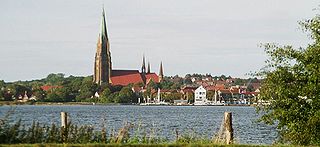
Schleswig is a town in the northeastern part of Schleswig-Holstein, Germany. It is the capital of the Kreis (district) Schleswig-Flensburg. It has a population of about 27,000, the main industries being leather and food processing. It takes its name from the Schlei (Slien), an inlet of the Baltic Sea at the end of which it sits, and vik or vig which means "bay" in Old Norse and Danish. Schleswig or Slesvig therefore means "bay of the Schlei".

Christian IX was King of Denmark from 15 November 1863 until his death in 1906. From 1863 to 1864, he was concurrently Duke of Schleswig, Holstein and Lauenburg.

The history of Schleswig-Holstein consists of the corpus of facts since the pre-history times until the modern establishing of the Schleswig-Holstein state.

Friedrich Wilhelm, Duke of Schleswig-Holstein-Sonderburg-Glücksburg was a German-Danish prince and officer who was the Duke of Schleswig-Holstein-Sonderburg-Beck from 1816 to 1825, and the Duke of Schleswig-Holstein-Sonderburg-Glücksburg from 1825 to 1831. Friedrich Wilhelm is the progenitor of the House of Glücksburg.

The First Schleswig War, also known as the Schleswig-Holstein Uprising and the Three Years' War, was a military conflict in southern Denmark and northern Germany rooted in the Schleswig-Holstein Question: who should control the Duchies of Schleswig, Holstein and Lauenburg, which at the time were ruled by the king of Denmark in a personal union. Ultimately, the Danish side proved victorious with the diplomatic support of the great powers, especially Britain and Russia, since the duchies were close to an important Baltic seaway connecting both powers.
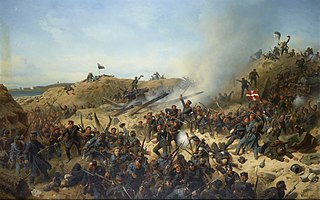
The Second Schleswig War, also sometimes known as the Dano-Prussian War or Prusso-Danish War, was the second military conflict over the Schleswig-Holstein Question of the nineteenth century. The war began on 1 February 1864, when Prussian and Austrian forces crossed the border into the Danish fief Schleswig. Denmark fought troops of the Kingdom of Prussia and the Austrian Empire representing the German Confederation.
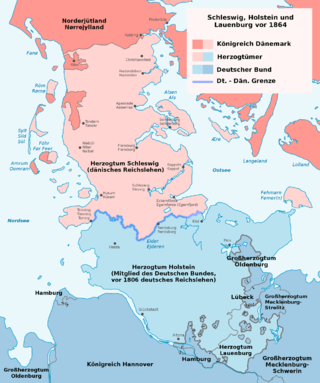
The Schleswig–Holstein question was a complex set of diplomatic and other issues arising in the 19th century from the relations of two duchies, Schleswig and Holstein, to the Danish Crown, to the German Confederation, and to each other.

Als is a Danish island in the Baltic Sea.

The Battle of Dybbøl was the key battle of the Second Schleswig War, fought between Denmark and Prussia. The battle was fought on the morning of 18 April 1864, following a siege that began on 2 April. Denmark suffered a severe defeat which – with the Prussian capture of the island of Als – ultimately decided the outcome of the war, forcing Danish cession of the duchies of Schleswig and Holstein.

Prince Charles of Hesse-Kassel was a cadet member of the house of Hesse-Kassel and a Danish general field marshal. Brought up with relatives at the Danish court, he spent most of his life in Denmark, serving as royal governor of the twin duchies of Schleswig-Holstein from 1769 to 1836 and commander-in-chief of the Norwegian army from 1772 to 1814.
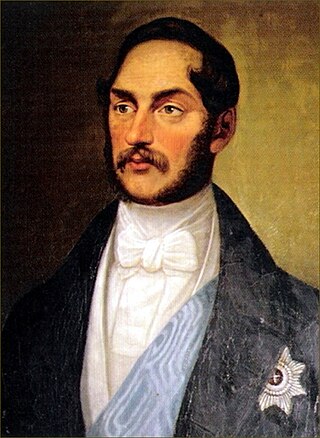
Karl, Duke of Schleswig-Holstein-Sonderburg-Glücksburg was Duke of Schleswig-Holstein-Sonderburg-Glücksburg from 1831 to 1878. Karl was the eldest son of Friedrich Wilhelm, Duke of Schleswig-Holstein-Sonderburg-Glücksburg, and Princess Louise Caroline of Hesse-Kassel and an elder brother of Christian IX of Denmark.

The monarchy of Denmark is a constitutional institution and a historic office of the Kingdom of Denmark. The Kingdom includes Denmark proper and the autonomous territories of the Faroe Islands and Greenland. The Kingdom of Denmark was already consolidated in the 8th century, whose rulers are consistently referred to in Frankish sources as "kings". Under the rule of King Gudfred in 804 the Kingdom may have included all the major provinces of medieval Denmark.

The Battle of Sankelmark was a minor battle during the Second Schleswig War. It took place on 6 February 1864 between Sankelmark and Oeversee, on the road between Schleswig and Flensburg, during the Danish retreat from Dannevirke.
Events from the year 1813 in Denmark.
Events from the year 1863 in Denmark.
Events from the year 1794 in Denmark.
1864 (MDCCCLXIV) was a leap year starting on Friday of the Gregorian calendar and a leap year starting on Wednesday of the Julian calendar, the 1864th year of the Common Era (CE) and Anno Domini (AD) designations, the 864th year of the 2nd millennium, the 64th year of the 19th century, and the 5th year of the 1860s decade. As of the start of 1864, the Gregorian calendar was 12 days ahead of the Julian calendar, which remained in localized use until 1923.

1864 is a 2014 Danish television historical war drama series written and directed by Ole Bornedal. It is based on two books by Tom Buk-Swienty about the Second Schleswig War of 1864 between Denmark and an alliance of Prussia and Austria which ended in defeat for Denmark and the loss of a quarter of its territory to Prussia. It follows two brothers from a remote village on Funen who enlist in the Danish army just before the outbreak of war, and experience the horrors of combat in Schleswig. It also features actual historical figures such as Danish prime minister D. G. Monrad and Prussian prime minister Otto von Bismarck. It was the most expensive Danish TV series to be made to date.
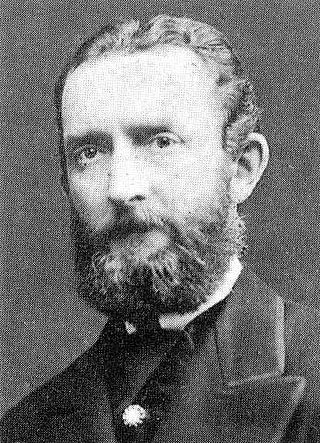
Prince Johann of Schleswig-Holstein-Sonderburg-Glücksburg was the ninth of the ten children of Friedrich Wilhelm, Duke of Schleswig-Holstein-Sonderburg-Glücksburg and Princess Louise Caroline of Hesse-Kassel. He was named after his ancestor John II, Duke of Schleswig-Holstein-Sonderburg.

The Danish Unitary State was a Danish political designation for the monarchical state formation of Denmark, Schleswig, Holstein, and Saxe-Lauenburg, between the two treaties of Vienna in 1815 and 1864. The usage of the term became relevant after the First Schleswig War, when a need for a constitutional framework for the monarchy was present, which ought to follow the premises of the London Protocol, which prohibited a closer connection between two of the monarchy's possessions. The political designation was ultimately eliminated after The Second Schleswig War and was replaced by the national state in 1866.


















